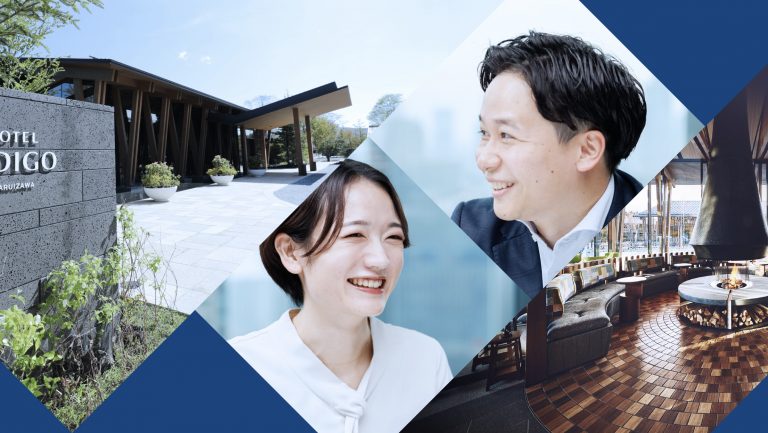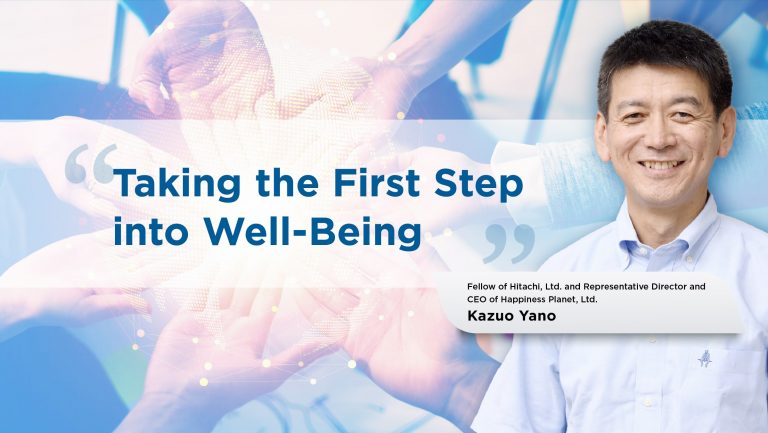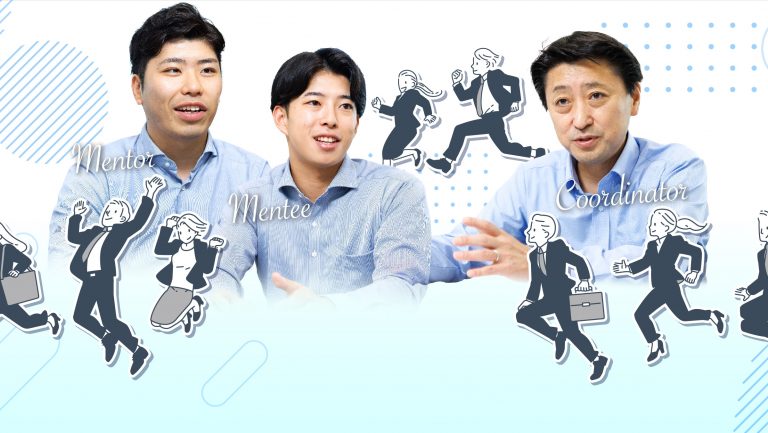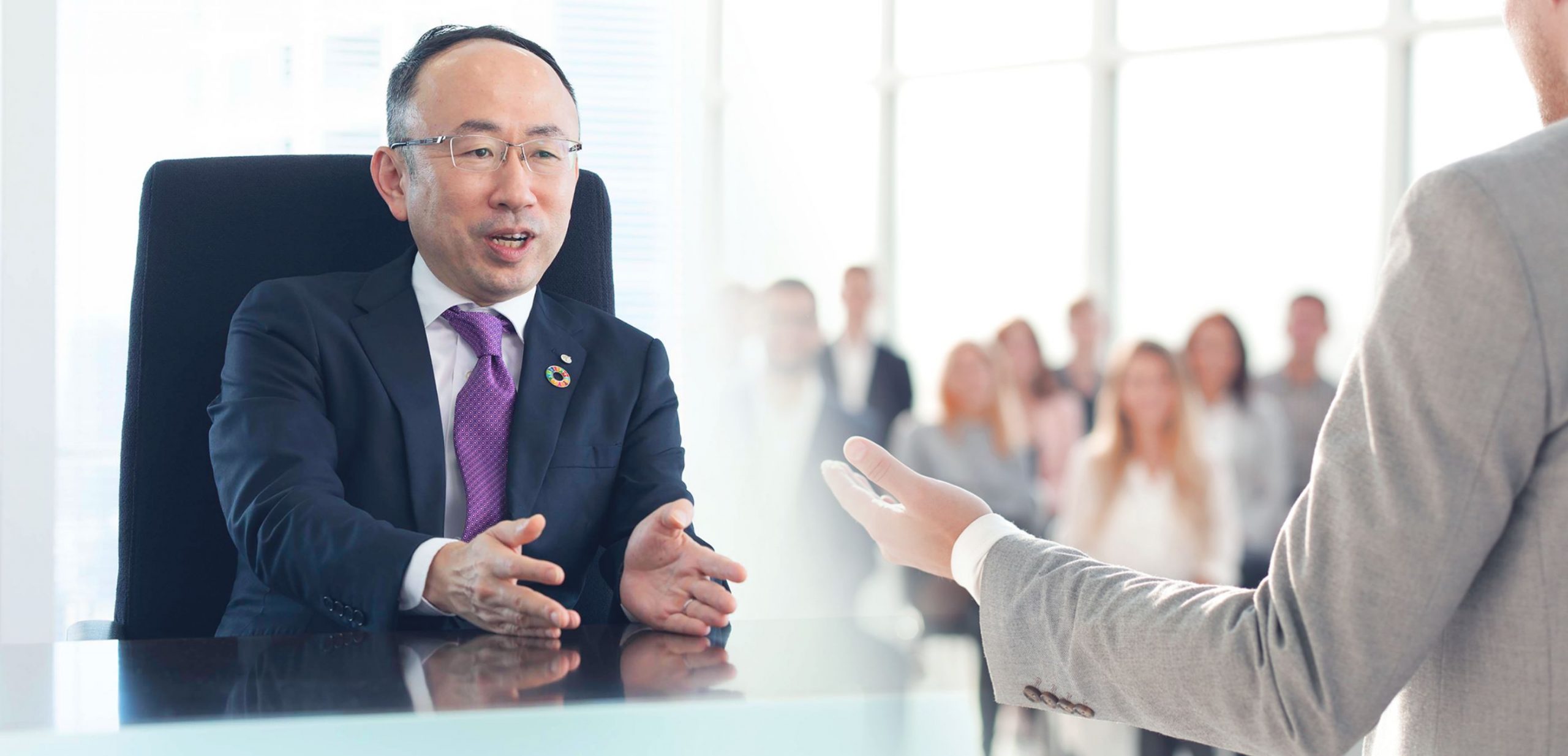
Launching a new business proposal program as a means of creating a culture that welcomes challenge
Dec 1, 2021
Tokyo Century prioritizes its human resource strategy and human resource development while engaging in diverse services and businesses. In 2019, the company conducted an engagement survey of all employees and reviewed the responses to identify various issues. It is now working to enhance employee participation at the company. One example of its efforts is the fiscal 2020 launch of the TC Biz Challenge, a program through which employees are encouraged to propose new businesses. We interviewed Managing Executive Officer Hirasaki, General Manager of the Corporate Planning Division and appointed as a board director this fiscal year, to find out what he thinks about the program.

Director and Managing Executive Officer Tatsuya Hirasaki
We Can Do Anything if We Make an Effort
――Can you tell us a little about your career path up to the present?
I joined Tokyo Leasing Co., Ltd., former Tokyo Century, as a new graduate and have spent most of my career in accounting and taxation. From my mid-30s, I had opportunities to also work in the areas of investor relations and corporate planning, so I believe I’ve gained expertise in corporate management and accounting through actual business experience. Recently, the diversity of employees as well as board directors has become especially important for listed companies. This means that a board of directors must be capable of competently addressing matters in a variety of fields using the diverse skills of their individual members. At Tokyo Century, you won’t find many people who have the same sort of career history as mine, which is why I’d like to put my particular strengths toward the company’s growth.
――Looking back, what was an unforgettable experience or turning point that continues to affect your career?
In the 1990s, when I joined the company, the Japanese economy was in recession after the economic bubble burst, and the company was experiencing significant challenges. As an accountant, I went through tough times dealing with the situation. Looking back, though, taking on those challenges represented valuable experiences that have are reflected in my work still today.
I was fortunate that I could be part of major projects that were turning points for the company, such as launching operations related to investor relations, the merger of Tokyo Leasing and Century Leasing System and, more recently, the capital and business alliance with NTT.
In addition to internal projects, I took part in a number of industrial activities, too. The new lease accounting project by the International Accounting Standards Board (IASB) and Financial Accounting Standards Board (FASB) was another memorable experience. For this one, various companies around the world, mainly in Europe and the Americas, involved in the leasing business, came together to discuss revising the lease accounting standards in Japan. When I joined the project, I was skeptical that a Japanese corporate employee could make an impact on international accounting standards. Also, the work wasn’t easy due to languages barriers and different ways of thinking. Nevertheless, I did my best to explain myself or get my points across to the other participants while referring to actual business practices as well as data, and gradually I gained their understanding. This gave me confidence and made me realize nothing is impossible--that we can do anything if we make an effort.

Left: Visited Marlowe, a suburb of London in his 30s for IR activities.
Right: In his 30s. With an accountant who likes soccer at Fulham Football Club Craven Cottage.
Developing a Culture That Encourages Taking on Challenges
――Currently, the TC Biz Challenge has been carried out as a part of human resource strategy and personnel development, which Tokyo Century places a top priority on. Can you tell us what was behind the program’s launch?
Tokyo Century views people as the most important aspect of its business, as they provide services and create businesses. This is why we give top priority to our human resource strategy.
The employee awareness survey prompted us to launch the TC Biz Challenge. You see, in 2019, we conducted our first large-scale survey of all employees, from which the responses provided a number of insights, including mention of both positive and negative aspects of the company. For example, some referred to the numerous changes at Tokyo Century and the company’s ability to quickly adapt to them, adding that many employees appeared to be taking on those challenges with a sense of pride. On the other hand, we discovered that employee motivation was declining from respondents’ comments indicating that they were reluctant to take on certain challenges and move forward. We concluded that this needed to change so that we could pursue our goals to create new services and businesses. We realized that we needed to develop a culture that encourages taking on challenges, so we established the TC Biz Challenge program to get employees doing that and proposing new businesses. After introducing the program, we held a seminar to gather ideas about new business. Although this was the first time, it was quite a success, as a quarter of all our employees were there, and we received 36 business ideas.
――How did the selection process work? And were there any notable achievements or discoveries in the first year?
Selection was based on two stages: screening applications and judging the presentations. As general manager of the Corporate Planning Division, I observed all the proposal presentations, from a wide range of applicants including new employees and managers from different divisions. Their enthusiasm was inspiring, and my motivation was high.
Finally, three teams of four members moved on to vie for the commercialization of their projects while carrying out their job responsibilities. In this November, we decided to commercialize one project for verification. I’m very pleased that the project is making progress. But most of all, I believe it’s important to establish a climate that encourages people to take on challenges, make sure this attitude takes root, and create a culture in which people acknowledge each other through this kind of initiative.
――Why are diverse human resources and highly specialized human resources so important for Tokyo Century?
The world, significantly affected by the COVID-19 pandemic that began at the end of 2019, is changing rapidly and has become a very uncertain place. This situation combined with global warming and the frequent occurrence of extreme weather events has made realizing a decarbonized society extremely urgent. In this context, Tokyo Century, as a company that takes part in the circular economy, must consider every possible means of solving issues. For example, we are expanding our renewable energy business and promoting life cycle management in a circular economy. To continue contributing to the resolution of such issues, however, will require developing and deploying highly specialized, diverse talent.

A Key Is Mutual Relationships of Trust
――What should Tokyo Century Group employees keep in mind, and what do you usually ask of your subordinates and colleagues?
I hope that all employees will recognize individual expertise or strengths as competitive advantages within the company and also applicable on a far broader scale and worthy of being refined. Not that many people are required, and new people brought on board don’t need to be the same as old hands. Moreover, any one person can only produce a limited number of ideas or results, so we must build up our organizational strength and team work to maximize results.
What is necessary for reinforcing organizational strength and team work? I think trust, including mutual relationships of trust, is the key. The concept of trust can be further broken down.
One is personal trust, which means acting with such integrity that others trust you, and the other is vocational trust at work, meaning you consistently perform high-quality, reliable work. I hope everyone will maintain a keen awareness toward achieving both kinds of trust.
In fact, when I think of a person who has these kinds of trust, I think of someone who has no barriers. This is someone who can accept others’ opinions with an open mind, and by doing so can expand their own thinking and come up with new ideas. They won’t reject an idea if it’s not the same as their own, but instead will try to exchange opinions. As a result, working with such people becomes exciting and inspires those around them. But this kind of relationship of trust doesn’t develop naturally just by being close to someone. You have to demonstrate sufficiently sound performance to earn someone else’s recognition while showing respect, sometimes supporting the other, and striving to have that individual recognize you as a partner who shares the same awareness. Age and rank are irrelevant.
I believe it’s highly important for everyone to find enough courage to engage in this kind of communication and the creation of a workplace environment.
Embracing the Diverse Qualities of Every Individual Drives Our Growth

――Before we wrap up, can you share with us your thoughts on the future?
The value of diversity and inclusion has gained currency at companies. Accepting the diverse qualities of every individual while also developing a sense of unity across an organization are both essential, as they drive a company’s growth and evolution. What’s more, trust between people is a prerequisite for accepting diversity. Regardless of one’s position, I believe that developing these two forms of trust will become increasingly vital.
Each of us living in the present will create society’s future. So that society will be able to bring joy to future generations, all of us today I hope will trust each other, create an environment that encourages us to take on challenges, and contribute to solving social problems by applying all of our knowledge and creativity.

Tatsuya Hirasaki
Director and Managing Executive Officer
Joined the Company in 1990. He has spent most of his career in accounting and taxation field.
He has been the General Manager of Corporate Planning Division since 2017, and President of Accounting Unit and Deputy President of Corporate Planning Unit since 2020.
*The contents of the article and the position titles are as of the date posted.
RECOMMEND ARTICLES
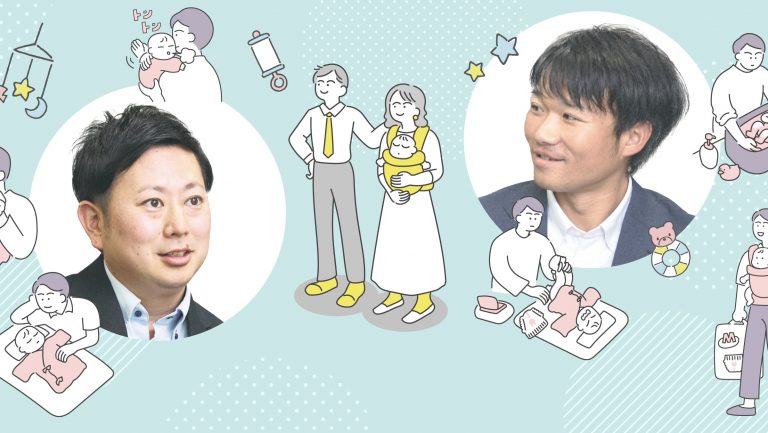
Feb 28, 2024
With the Act on Chil…
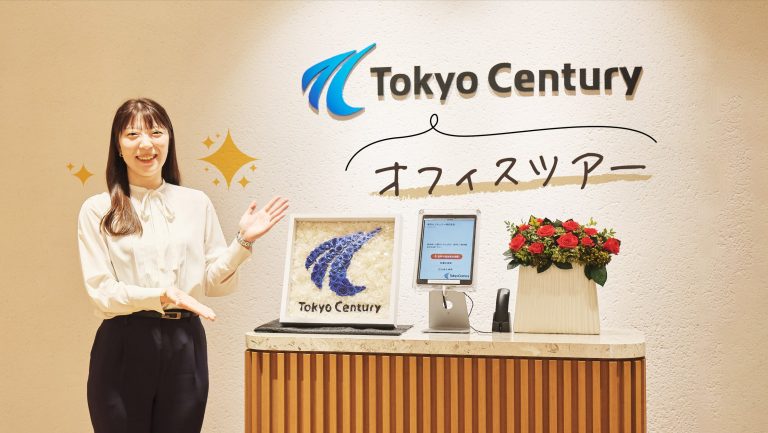
Sep 27, 2023
TOKYO TORCH is a new…


